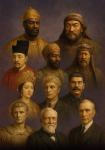Already, tens of millions of workers whether in the manufacturing industries or informal service activities were retrenched the world over and they don't know where to go.
The large-scale close-down of factories whether in China, the world's manufacturing centre, or in the industrialised world, especially those recent ideological converts who joined the European Union in the hope of capitalist bliss poses a serious challenge to global security.
A recent intelligence report prepared by the US state department spoke of the great security challenge arising from the raging economic storm. True, the world had lived with such calamitous times in the past. But the ferocity of each crisis had only multiplied as compared to the one before.
Therefore, to dismiss Clintons message out of hand as one coming from a non-governmental individual by a prominent World Trade Organisation official, speaks volumes about the prevailing denial syndrome.
Doubt, doubt everything, said Descartes, the great French philosopher of the 17th century. Descartes brought about an intellectual upheaval that caused a shift from a geocentric view to a heliocentric view premised on the sun being the centre of everything and not earth.
But some modern-day officials and policy makers continue to behave like religious militants of medieval times, chanting those same mantras markets on their own will take care of everything and unimpeded trade liberalisation is the best option for countries to lift their daridra narayans (the poorest of the poor) out of abysmal poverty.
They refuse to see the writing on the wall. Nor are they willing to consider any midcourse correction.
Consider, for instance, the need for a stimulus package to reactivate the paralysed economies. Whether it is in the industrialised countries or poor countries, the need of the hour is expansionary fiscal policies to address the deficient demand.
Obviously, these policies are bound to throw fiscal rectitude to the winds and make balanced-budgets a relic of the past. The economic fundamentalists are bound to cry hoarse as one of their cardinal mantras is now proved impotent.
Of course, all countries are not in the same position and there is a great diversity in regard to both social and economic constraints. While it would be easy for some countries to raise monies for their stimulus packages, others will have to struggle for assistance from the International Monetary Fund or World Bank.
Surely, the powerful countries some of whom have a profligate fiscal track record can easily borrow funds from international markets and, thereby, crowd out the minnows.
Now the question is whether the minnows should be further squeezed by IMF and World Bank, even though they are not responsible for causing this grave economic crisis? And worse still, should they be asked to undertake reforms in areas that have little relevance to the global meltdown?
Or take another example, the subsidies and state aid to protect industries. These again Buy America provisions or curbs on deploying foreign personnel in IT projects or asking employers to retrench foreign workers ahead of local staff before the global downturn spills blood on the streets poses a greater threat than the repeat of Smoot-Hawley-type of tariffs of 1930.
While conventional wisdom holds Smoot-Hawley tariffs which increased average industrial tariffs on imports from 37 to 48 per cent in the US responsible for the Great Depression, there is also sufficient evidence and research to show that these tariffs had little to do with protectionism and, if anything, trade shrinkage after the depression had more to do with shrinking demand and the drying-up of trade credits.
But theological representatives of the global trade body treat tariffs as the problem but not the insidious and more deadly forms of protectionism couched in sexed-up terms like greening initiative of some 2.5 billion pounds for the British auto industry, creating European industrial champions, not wholesale offshoring of jobs, state aid for French carmakers should depend on a pledge to keep jobs in France and so on. Is it that they are engaged in a deliberate game of missing the woods for the trees?






